As a recruiter, you know the digital landscape is constantly evolving. Companies often struggle to find digital marketers who can navigate this ever-changing terrain and drive real results. The key is to look beyond buzzwords and focus on candidates who demonstrate a mix of analytical skills, creativity, and adaptability. Remember, a great digital marketer isn't just about knowing the latest trends—it's about understanding how to leverage them for business growth.
This guide will walk you through the process of hiring a top-notch digital marketer, from identifying the right skills to structuring effective interviews. We'll also explore how to use digital marketing assessment tests to evaluate candidates objectively and ensure you're bringing the best talent on board.
Table of contents
Why Hire a Digital Marketer?
A digital marketer can help your business thrive in the online world. They can tackle challenges like low website traffic, poor social media engagement, or ineffective email campaigns. For example, if your e-commerce site isn't converting visitors into customers, a digital marketer can optimize your product pages and implement targeted advertising strategies.
Digital marketers bring a wide range of skills to the table, including:
- Search engine optimization (SEO)
- Social media management
- Content creation and strategy
- Pay-per-click (PPC) advertising
- Email marketing
Consider hiring a full-time digital marketer when you have ongoing marketing needs and want to build a consistent online presence. If you're unsure about committing to a full-time hire, start with a consultant or agency to assess your needs and see the potential impact on your business.
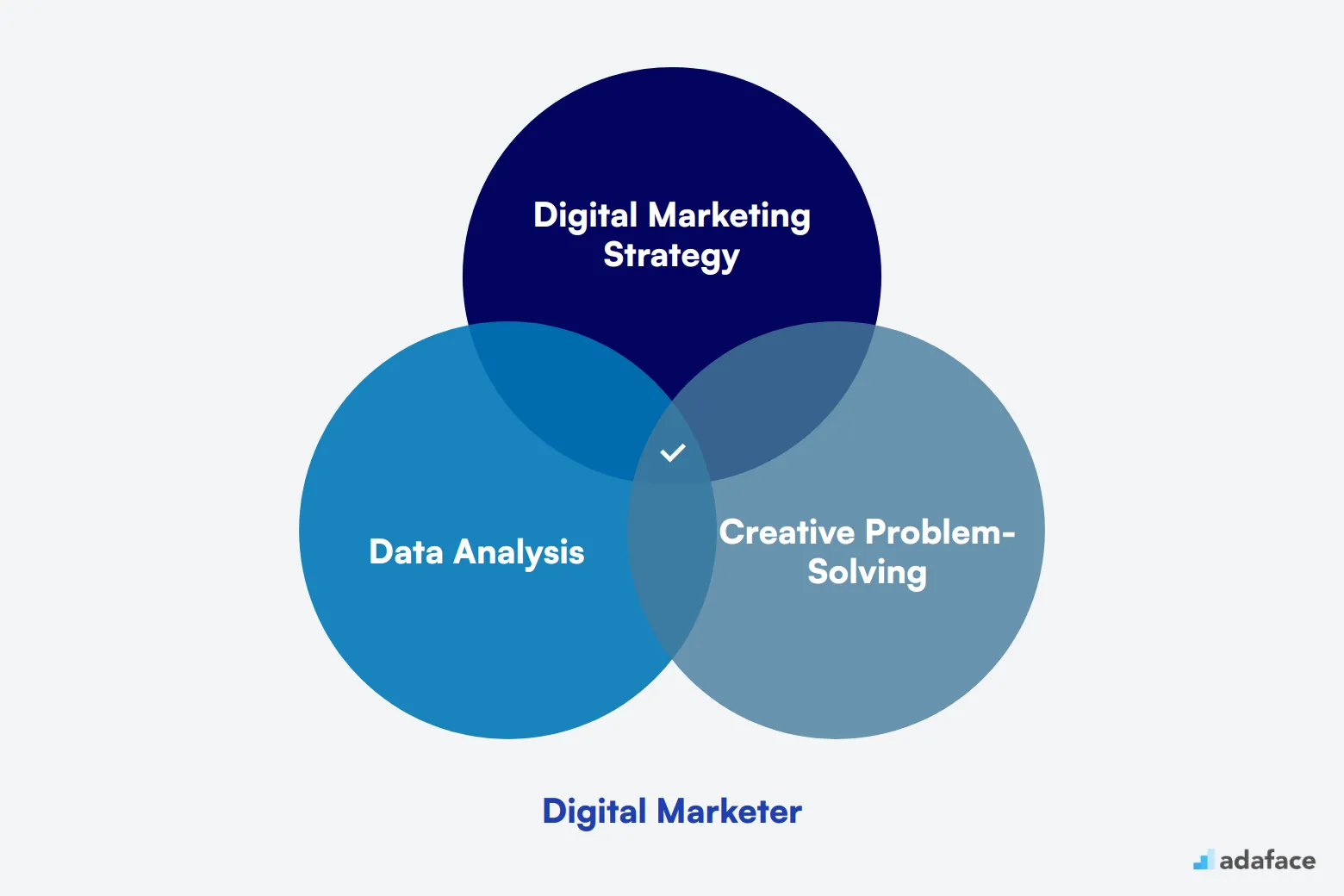
What does a Digital Marketer do?
A Digital Marketer is responsible for promoting products or services through various online channels. They utilize strategies across platforms like social media, search engines, email, and websites to reach and engage with potential customers.
Day-to-day tasks of a Digital Marketer include:
- Conducting market research to identify trends and target audiences.
- Developing and executing digital marketing campaigns.
- Analyzing campaign performance and adjusting strategies accordingly.
- Managing social media accounts and engaging with followers.
- Creating and optimizing content for search engine visibility.
- Utilizing tools like Google Analytics to measure and report on marketing efforts.
Digital Marketer Hiring Process
The hiring process for a Digital Marketer role typically spans 4-6 weeks. Here's a quick overview:
- Define the job description and post it on relevant job boards.
- Shortlist resumes and conduct initial screening calls within the first 1-2 weeks.
- Administer relevant skill assessments and case studies to evaluate practical abilities.
- Conduct in-person or video interviews with the top candidates.
- Extend an offer to the most suitable candidate and complete onboarding formalities.
While the timeline may vary, a well-structured process ensures you attract and hire the best digital marketing talent efficiently.
Key Skills and Qualifications for Hiring a Digital Marketer
When hiring a digital marketer, establishing the right candidate profile is essential. It's common for recruiters to misjudge the balance between required and preferred qualifications, leading to mismatched expectations. Understanding this distinction can help streamline your hiring process and attract the best candidates.
To guide you in forming your ideal candidate profile, consider these required and preferred skills and qualifications:
- Required Skills:
- Bachelor's degree in Marketing, Business, or related field
- 3+ years of experience in digital marketing
- Proficiency in SEO, SEM, and social media marketing
- Strong analytical skills and experience with data-driven marketing
- Excellent written and verbal communication skills
- Preferred Skills:
- Experience with marketing automation tools
- Knowledge of HTML, CSS, and basic web development
- Certification in Google Analytics or similar platforms
- Experience with A/B testing and conversion rate optimization
- Familiarity with content management systems
| Required skills and qualifications | Preferred skills and qualifications |
|---|---|
| Bachelor's degree in Marketing, Business, or related field | Experience with marketing automation tools |
| 3+ years of experience in digital marketing | Knowledge of HTML, CSS, and basic web development |
| Proficiency in SEO, SEM, and social media marketing | Certification in Google Analytics or similar platforms |
| Strong analytical skills and experience with data-driven marketing | Experience with A/B testing and conversion rate optimization |
| Excellent written and verbal communication skills | Familiarity with content management systems |
How to Write a Digital Marketer Job Description
Once you've identified the ideal candidate profile for your digital marketing role, it's time to craft a compelling job description. A well-written JD is key to attracting top talent in this competitive field.
Here are some tips to create an effective digital marketer job description:
- Highlight key responsibilities and impact: Clearly outline the role's duties, such as managing social media campaigns, optimizing SEO strategies, and analyzing marketing metrics. Emphasize how the marketer's work will drive business growth and brand awareness.
- Balance technical skills with soft skills: List required technical proficiencies like Google Analytics, SEO tools, and social media platforms. Also mention soft skills such as creativity, adaptability, and strong communication abilities.
- Showcase your company's unique selling points: Highlight what makes your organization stand out, whether it's innovative projects, opportunities for professional development, or a dynamic work culture. This will help attract candidates who align with your company values.
10 platforms to hire digital marketers
Now that you have a clear job description, the next step is to list the position on job sites to attract potential candidates. Finding a digital marketer can be challenging, so using the right platforms to source candidates is important. Below are some popular options to help you hire the best talent.
LinkedIn Jobs
Ideal for finding full-time digital marketing professionals. Offers extensive networking capabilities and detailed candidate profiles.

Indeed
Versatile platform for posting all types of digital marketing positions. Offers a large pool of candidates and easy application process.

Upwork
Excellent for hiring freelance digital marketers. Provides detailed profiles, portfolios, and a robust vetting process.

In addition to LinkedIn Jobs, Indeed, and Upwork, there are several other platforms that can simplify the hiring process. FlexJobs is great for finding remote marketers, while AngelList is ideal for startups. If you're looking for elite freelancers, Toptal might be your best bet. Platforms like Glassdoor help manage your employer brand and attract quality candidates. Consider specialized sites like Dice for tech-focused roles and MarketingHire for marketing specialists. ZipRecruiter uses AI to match you with suitable candidates quickly. To learn more about digital hiring, explore our insights on digital hiring.
Keywords to Look for in Digital Marketer Resumes
Resume screening is a key step in finding the right digital marketer. It helps you quickly identify candidates with the skills and experience you need, saving time in the hiring process.
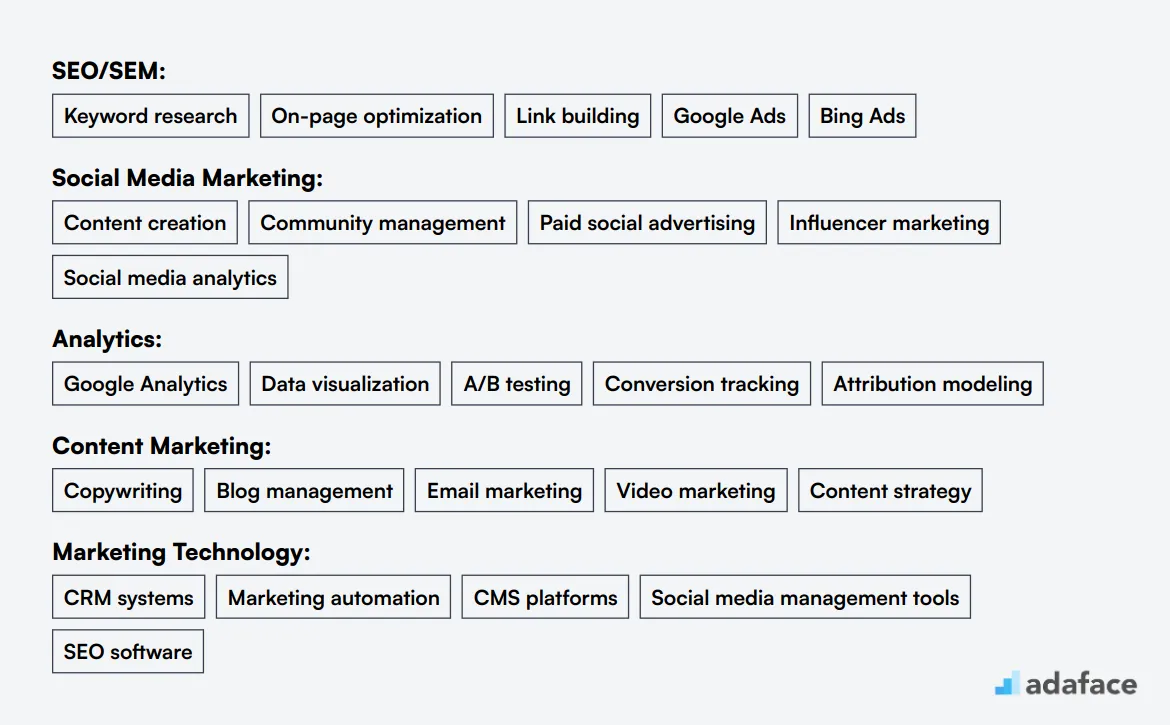
When manually screening resumes, focus on key digital marketing skills and tools. Look for terms like SEO, SEM, social media marketing, content strategy, and analytics. Pay attention to specific platforms mentioned, such as Google Analytics or marketing automation tools.
AI-powered resume screening can speed up this process. You can use tools like ChatGPT or Claude to analyze resumes based on your job requirements. This approach can help you quickly sort through large numbers of applications.
Here's a sample prompt for AI-powered resume screening:
TASK: Screen resumes for a digital marketer role
INPUT: Resumes
OUTPUT: For each resume, provide:
- Email
- Name
- Matching keywords
- Score (out of 10)
- Recommendation
- Shortlist (Yes, No, or Maybe)
KEYWORDS:
- SEO/SEM (keyword research, on-page optimization)
- Social media marketing (content creation, paid advertising)
- Analytics (Google Analytics, A/B testing)
- Content marketing (copywriting, email marketing)
- Marketing technology (CRM, automation tools)
Recommended Skills Tests for Digital Marketers
Skills tests are an excellent way to evaluate digital marketing candidates beyond their resumes. They provide insights into a candidate's practical abilities and knowledge. Here are five key tests we recommend for assessing digital marketers:
Digital Marketing Test: This comprehensive assessment covers various aspects of digital marketing, including SEO, content marketing, and social media strategies. It helps gauge a candidate's overall understanding of digital marketing principles and practices.
SEO Assessment Test: Search engine optimization is a core skill for digital marketers. An SEO test evaluates a candidate's knowledge of on-page and off-page SEO techniques, keyword research, and search engine algorithms.
Google Ads Test: Pay-per-click advertising is a major component of digital marketing. A Google Ads assessment checks a candidate's proficiency in creating and managing ad campaigns, understanding bidding strategies, and optimizing ad performance.
Content Strategy Test: Content is king in digital marketing. A content strategy assessment evaluates a candidate's ability to plan, create, and distribute engaging content across various digital channels.
Google Analytics Test: Data analysis is crucial for measuring marketing success. A Google Analytics test assesses a candidate's skills in tracking website performance, interpreting data, and deriving actionable insights to improve marketing strategies.
How to Structure the Interview Stage for Hiring Digital Marketers
After identifying promising candidates through skills tests, it's time to move them to the technical interview stage. This process evaluates their hard skills, crucial for determining who is truly fit for the role. Skills tests are great for filtering out unfit candidates but may not always identify those best suited for the position. This is where specific interview questions come into play.
Here are some recommended interview questions for digital marketers: What digital marketing tools are you proficient with? This reveals their hands-on experience with industry tools. Can you describe a successful digital campaign you've managed? This assesses their practical application of skills. How do you stay updated with digital marketing trends? Staying current is critical in this fast-evolving field. Explain how you measure the success of a marketing campaign. Understanding metrics and data analysis is key. How would you handle a drop in website traffic? This tests problem-solving skills. For detailed skills, you may refer to the skills required for digital marketer.
What is the Cost of Hiring a Digital Marketer?
Hiring a digital marketer can vary significantly based on location, experience, and market conditions. In the United States, salaries range from $36,092 to $102,453, with an average salary of around $66,062. In the Philippines, the national average is approximately ₱324,403, with entry-level positions starting at ₱162,611 and experienced professionals earning up to ₱647,171. When budgeting for a digital marketer, consider these variations to align your hiring strategy with market standards.
Digital Marketer Salary in the United States
The average salary for a Digital Marketer in the United States is around $66,062. Depending on the location, salaries can start at approximately $36,092 and can go up to $102,453.
For instance, in Washington, DC, the median salary is about $73,261, while in Atlanta, GA, it’s $71,006. These figures can vary widely, so it's important to consider local market rates when making hiring decisions.
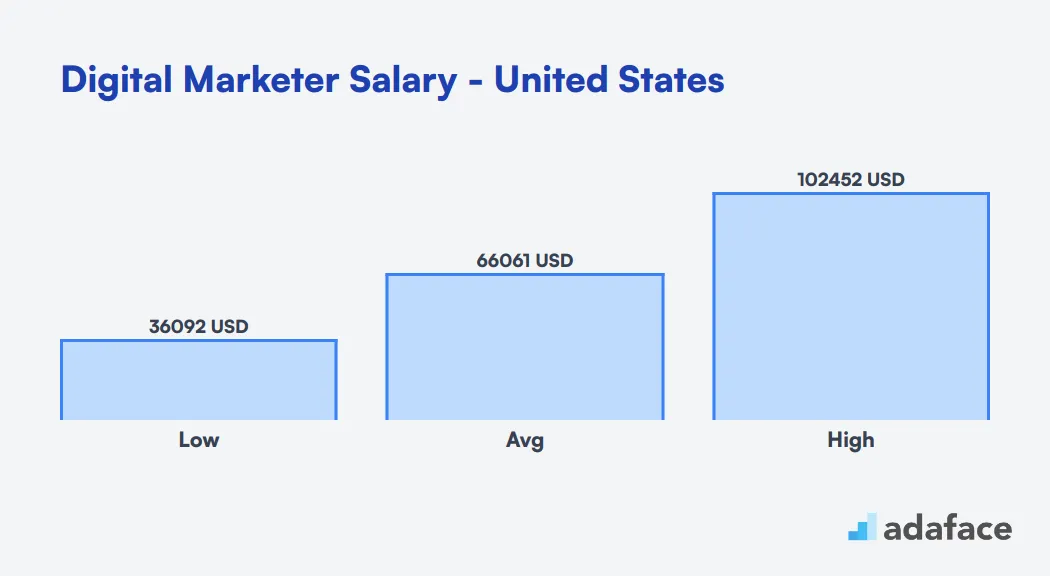
Digital Marketer Salary United Kingdom
In the United Kingdom, the average salary for a digital marketer ranges from £25,000 to £60,000 per year. Entry-level positions typically start at the lower end of the scale, while experienced professionals in more senior roles can earn upwards of £60,000 or more. Salaries can vary based on location, with London often offering higher compensation due to the cost of living.
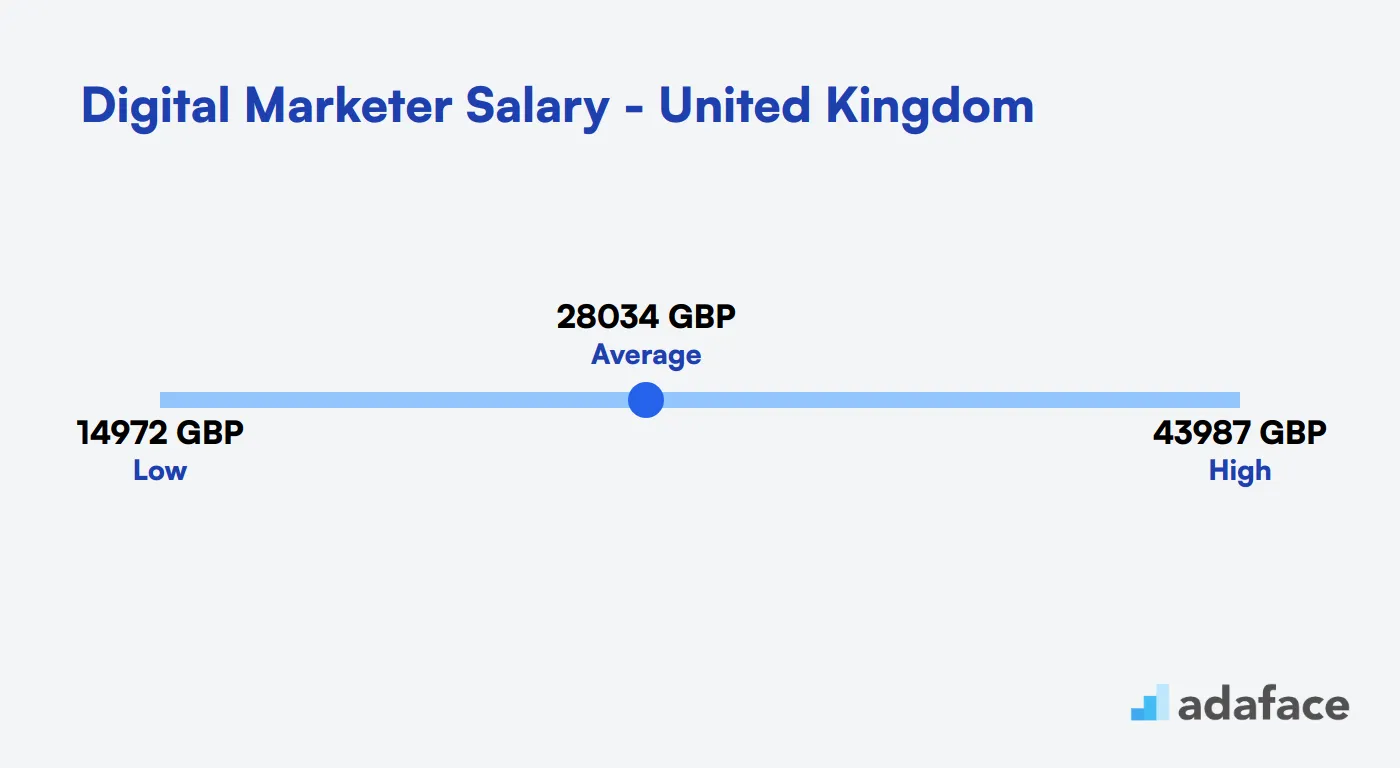
Digital Marketer Salary in the Philippines
Digital Marketers in the Philippines can expect varying salaries based on location and experience. In Clark Freeport Zone, salaries range from ₱285,383 to ₱1,054,679, with a median of ₱548,623. Taguig and Mandaluyong offer similar ranges, with medians around ₱450,000.
Manila and Cebu City have comparable salary ranges, with medians of ₱448,184 and ₱436,399 respectively. The national average for Digital Marketers in the Philippines is approximately ₱324,403, with entry-level positions starting around ₱162,611 and experienced professionals earning up to ₱647,171.
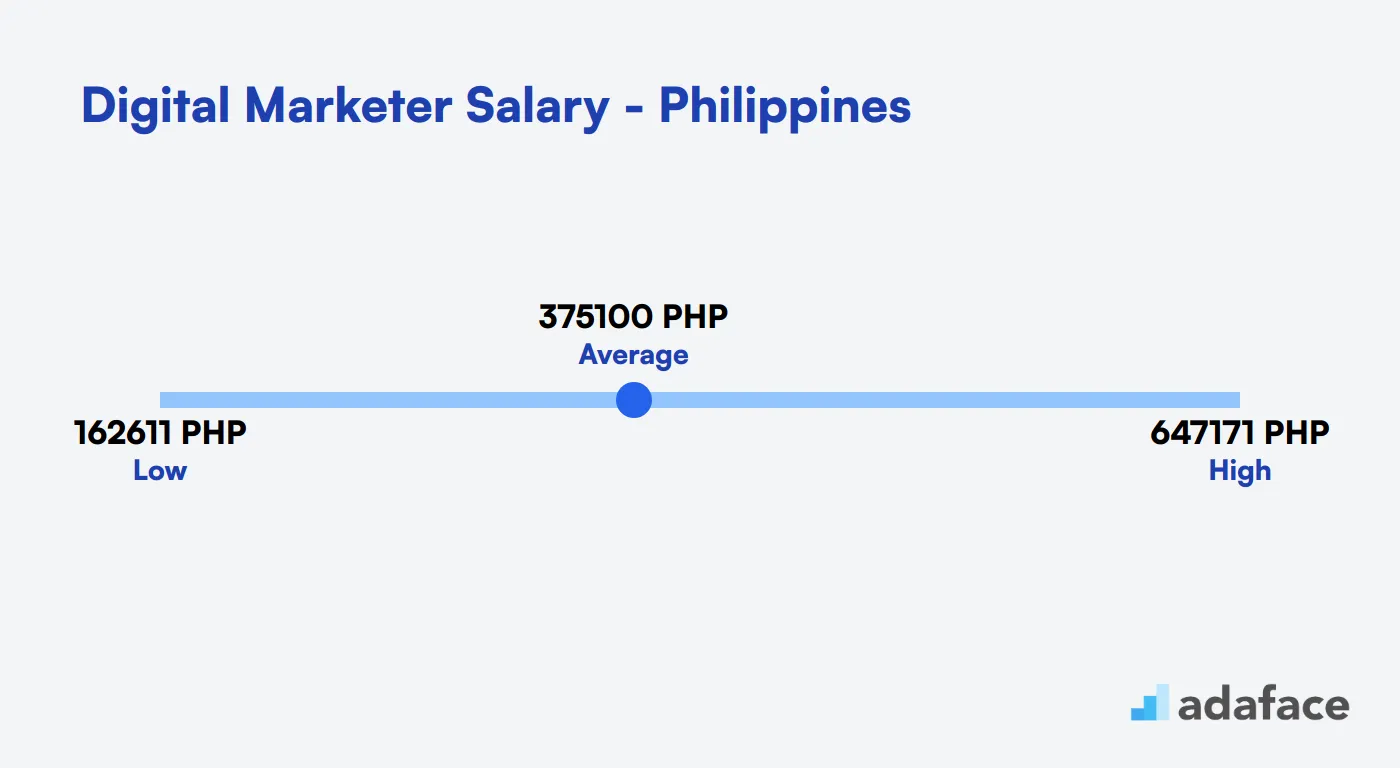
What's the difference between a Social Media Manager and an SEO Specialist?
At first glance, Social Media Managers and SEO Specialists may seem to overlap as both roles focus on online presence, but their objectives and methods differ significantly. Both work in the digital marketing sphere and often collaborate, yet they tend to use distinct strategies tailored to their unique goals.
A Social Media Manager's main focus is engaging with audiences across platforms like Facebook, Twitter, and Instagram. They use tools such as Hootsuite and Buffer to schedule posts and measure success based on metrics such as engagement and follower growth. They often have a background in marketing or communications and collaborate with creative teams and influencers to build brand awareness and online community.
On the other side, an SEO Specialist concentrates on improving a website's visibility on search engines. They rely on tools like Google Analytics and SEMrush, focusing on organic traffic and keyword rankings. Typically, they come from backgrounds in marketing or IT and work closely with content writers and web developers to optimize content for search engines. Their ultimate aim is to boost website traffic rather than social media interaction.
To get a better understanding of the skills required for a digital marketer, you might want to explore our blog on skills required for a digital marketer.
| Social Media Manager | SEO Specialist | |
|---|---|---|
| Primary Focus | Social Media Platforms | Search Engine Optimization |
| Tools Used | Hootsuite, Buffer, Sprout Social | Google Analytics, SEMrush, Ahrefs |
| Key Metrics | Engagement, Follower Growth | Organic Traffic, Keyword Rankings |
| Content Responsibility | Creating and Curating | Optimizing for Search Engines |
| Required Skill Set | Copywriting, Audience Engagement | Keyword Research, Technical SEO |
| Typical Background | Marketing, Communications | Marketing, IT |
| Collaboration With | Creative Team, Influencers | Content Writers, Web Developers |
| Goal | Brand Awareness and Community Building | Website Visibility and Traffic |
What are the ranks of Digital Marketers?
Digital marketing roles can often be confusing due to the wide range of titles and responsibilities. Understanding the hierarchy within digital marketing can help recruiters and hiring managers identify the right fit for their teams.
• Digital Marketing Manager: This is often a mid-level role responsible for overseeing and executing marketing strategies across various digital channels. They coordinate between different teams and ensure that campaigns align with overall business goals.
• SEO Specialist: An SEO Specialist focuses specifically on optimizing website content to improve search engine rankings. Their work is critical in driving organic traffic and involves keyword research, on-page optimization, and link-building strategies.
• Content Marketer: Content Marketers create valuable content aimed at attracting and retaining a target audience. They often work with SEO Specialists to ensure that the content is optimized for search engines while providing useful information to readers.
• Social Media Manager: This role is responsible for managing an organization's presence on social media platforms. They create and schedule posts, engage with followers, and analyze performance metrics to improve engagement strategies.
• Growth Marketer: Growth Marketers focus on strategies to drive measurable growth through various marketing techniques, including A/B testing and performance marketing. They often take a data-driven approach to determine the most effective channels for acquiring customers.
• Email Marketing Specialist: This specialist designs and executes email marketing campaigns to engage customers. They analyze email performance metrics and refine strategies to improve open and conversion rates.
• Marketing Analyst: Marketing Analysts gather and interpret data related to marketing performance. They provide insights that guide marketing strategies and help identify trends and opportunities for improvement.
Hire the Best Digital Marketers for Your Team
In this blog post, we've covered the importance of hiring a digital marketer, the roles they play, and the steps involved in the hiring process. We've also discussed the key skills to look for and how to structure interviews to find the best fit for your organization.
The most significant takeaway is to use accurate job descriptions and skills tests to enhance your hiring process. Implementing targeted assessments like an SEO assessment test can make a big difference in identifying the right talent. By doing so, you ensure that you're bringing on board digital marketers who meet your specific needs and can contribute effectively to your team's success.
Digital Marketing Test
FAQs
Prioritize a mix of technical and soft skills, including SEO knowledge, data analysis, content creation, social media expertise, adaptability, and strong communication. Look for candidates who demonstrate strategic thinking and can align digital initiatives with business goals.
Use a combination of methods such as digital marketing skills tests, portfolio reviews, and scenario-based questions during interviews. This multi-faceted approach helps evaluate both theoretical knowledge and practical application of skills.
Ask about their experience with specific campaigns, tools they're proficient in, how they measure success, and their approach to staying updated with industry trends. For a comprehensive list, check out our digital marketer interview questions.
While industry experience can be beneficial, it's not always necessary. Focus on transferable skills and a candidate's ability to adapt strategies across different sectors. A diverse background can often bring fresh perspectives to your marketing efforts.
This depends on your company's needs. A generalist can handle various aspects of digital marketing, while a specialist excels in specific areas like SEO or content marketing. Consider your team structure and current gaps when making this decision.
Look for candidates who show a commitment to continuous learning. Ask about their preferred resources for staying informed, any recent courses or certifications they've completed, and how they've implemented new strategies based on industry changes.
Use case studies or data interpretation exercises during the interview process. Ask candidates to analyze a sample campaign report and propose strategies based on the data. This will showcase their ability to turn insights into actionable plans.

40 min skill tests.
No trick questions.
Accurate shortlisting.
We make it easy for you to find the best candidates in your pipeline with a 40 min skills test.
Try for freeRelated posts
Free resources



